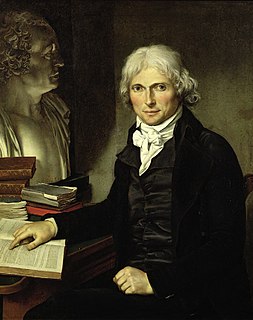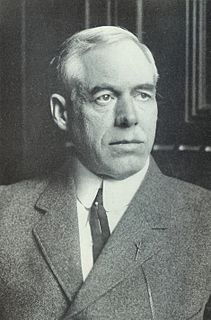A Quote by Marie Francois Xavier Bichat
Medicine is an incoherent assemblage of incoherent ideas, and is, perhaps, of all the physiological Sciences, that which best shows the caprice of the human mind. What did I say! It is not a Science for a methodical mind. It is a shapeless assemblage of inaccurate ideas, of observations often puerile, of deceptive remedies, and of formulae as fantastically conceived as they are tediously arranged.
Related Quotes
The history of science, like the history of all human ideas, is a history of irresponsible dreams, of obstinacy, and of error. But science is one of the very few human activities-perhaps the only one-in which errors are systematically criticized and fairly often, in time, corrected. This is why we can say that, in science, we often learn from our mistakes, and why we can speak clearly and sensibly about making progress there. In most other fields of human endeavour there is change, but rarely progress ... And in most fields we do not even know how to evaluate change.
It is no exaggeration to say that every human being is hypnotized to some extent either by ideas he has uncritically accepted from others or ideas he has repeated to himself or convinced himself are true. These negative ideas have exactly the same effect upon our behavior as the negative ideas implanted into the mind of a hypnotized subject by a professional hypnotist.
What counts, in the long run, is not what you read; it is what you sift through your own mind; it is the ideas and impressions that are aroused in you by your reading. It is the ideas stirred in your own mind, the ideas which are a reflection of your own thinking, which make you an interesting person
The ordinary method of education is to imprint ideas and opinions, in the strict sense of the word, prejudices, on the mind of the child, before it has had any but a very few particular observations. It is thus that he afterwards comes to view the world and gather experience through the medium of those ready-made ideas, rather than to let his ideas be formed for him out of his own experience of life, as they ought to be.
The acts of the mind, wherein it exerts its power over simple ideas, are chiefly these three: 1. Combining several simple ideas into one compound one, and thus all complex ideas are made. 2. The second is bringing two ideas, whether simple or complex, together, and setting them by one another so as to take a view of them at once, without uniting them into one, by which it gets all its ideas of relations. 3. The third is separating them from all other ideas that accompany them in their real existence: this is called abstraction, and thus all its general ideas are made.
Preconceived ideas are like searchlights which illumine the path of the experimenter and serve him as a guide to interrogate nature. They become a danger only if he transforms them into fixed ideas-this is why I should like to see these profound words inscribed on the threshold of all the temples of science: 'The greatest derangement of the mind is to believe in something because one wishes it to be so.'
The inlet of a man's mind is what he learns; the outlet is what he accomplishes. If his mind is not fed by a continued supply of new ideas which he puts to work with purpose, and if there is no outlet in action, his mind becomes stagnant. Such a mind is a danger to the individual who owns it and is useless to the community.































